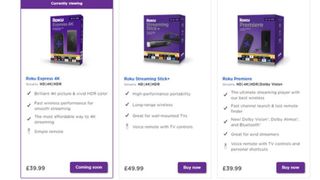
The Roku Premiere raised the bar for mid-level 4K HDR streamers when it launched back in 2018 – but with the arrival of the Roku Express 4K in 2021, it now finds itself sandwiched between both cheaper and more premium Roku options available to customers looking for a high quality alternative to the Amazon Fire TV Stick 4K or Google Chromecast.
What, then, is Roku to do to keep its once-impressive mid-tier streamer relevant to today’s market? The answer, we think, is to add Dolby Vision support to the Premiere – and some suspicious recent activity from the company suggests it may be considering such an update.
As part of a now-deleted product listing spotted by PocketLint on Roku’s own website, the Roku Premiere appears alongside a feature list which details "New! Dolby Vision, Dolby Atmos, and Bluetooth." So what would this mean for the current Roku lineup?
- Which is the best Roku streaming device for you?
- The best TVs of 2021
- Which streaming service is the best?
While Dolby Atmos was supported on the previous iteration of the streamer via passthrough, the potential addition of Dolby Vision support would mark a major new feature currently only available on the company’s most expensive offering, the 4K HDR Roku Ultra.

We’ve already seen Roku add 4K resolution to what was previously an HD-only model in the Roku Express, so it makes sense that it would look to upgrade its existing mid-tier streamer without reaching the price heights of the Roku Ultra.
Roku has, however, since refuted suggestions that the Roku Premiere is set for a major update, claiming the feature list was mistakenly copied over from the Roku Ultra product listing.
We’re not convinced, though. For starters, Dolby Vision and Bluetooth support don’t represent “New!” additions to the Roku Ultra – it arrived with both features at launch – and so the copy spotted alongside the Roku Premiere can’t really have been lifted over in its original form.
Get daily insight, inspiration and deals in your inbox
Get the hottest deals available in your inbox plus news, reviews, opinion, analysis and more from the TechRadar team.
What’s more, the Roku Premiere originally shipped in the company’s once-customary orange packaging, and the supposedly accidental product listing shows the same device packaged in Roku’s newer, purple box.
A necessary update
Still, even if Roku’s associating Dolby Vision support with the Roku Premiere was indeed an innocent mistake, we think it’s a necessary step the company needs to take to create a bigger feature gap between its mid-tier streamer and the Express 4K model – which is almost an identical device.
In fact, the Express 4K, which is billed as the company’s affordable offering, actually boasts a more powerful processor and dual-band Wi-Fi over the Premiere, despite retailing for the same price.
In the US and UK, the Roku Premiere is priced at $39.99 / £39.99 (though regular sales means you can likely pick one up for around $24.99 / £29.99) which is the same figure demanded by the Roku Express 4K.
When the Express added 4K functionality on top of its original HD offering, its price jumped by $10 / £10. If Roku does indeed add Dolby Vision support for the Premiere, then – as we think it needs to – it follows that the company would bump up its original price slightly.
But given that the newest Roku Ultra retails for $99.99 (it’s not yet available outside of the US), a price of around $49.99 / £49.99 / $AU65 would see it adopt a more logical position between its more affordable and expensive siblings.
At present, though, the Roku Premiere is less mid-tier and more, well, old news.

Axel is a London-based Senior Staff Writer at TechRadar, reporting on everything from the latest Apple developments to newest movies as part of the site's daily news output. Having previously written for publications including Esquire and FourFourTwo, Axel is well-versed in the applications of technology beyond the desktop, and his coverage extends from general reporting and analysis to in-depth interviews and opinion.
Axel studied for a degree in English Literature at the University of Warwick before joining TechRadar in 2020, where he then earned an NCTJ qualification as part of the company’s inaugural digital training scheme.
Most Popular

